- Home
- Joseph Bruchac
Brothers of the Buffalo Page 11
Brothers of the Buffalo Read online
Page 11
The first leg of their journey would be thirty-six miles. That would take them to an abandoned fort on the Cimarron River. The plan was to get there before dark—which came early and sudden in February. Thus they had to press on without pause, but not at a gallop. They had to do no more than a slow trot at best, for the four wagons to keep pace, and be wary of places where drifts were so deep they would overtop both horse and rider. Lost in such deep snow, a man might not be found till spring when his frozen carcass was exposed by the melting snow.
The lieutenant seemed to have finished his soliloquy. The two of them were now riding close to the west side of the second wagon. That cut the wind enough for it to feel the tiniest mite warmer.
Thank the Lord we have these wagons, Wash thought. They are about all that is going to keep us alive once the night comes on, seeing as how they carry not just our tents, but Sibley camp stoves and a good supply of wood.
Except he had to survive until then. He tried thinking about those Sibleys to take his mind off of freezing.
Just imagine, Wash, how warm it is going to be, holding your hands close to that little stove and soaking in its heat.
A blast of wind lifted a double handful of snow off the wagon to land right in his face and trickle down his neck, wiping away the image of that hot stove.
What else could he think of that might warm him inside, keep him going? A face came to mind. Bethany, the sergeant’s niece. Her pretty, perfect brown countenance looking right at him. And smiling, not frowning.
Bethany’s aunt was Sarah, the wife of Sergeant Brown. She and Bethany were brought up on the same plantation in west Louisiana. When Emancipation came, they took off for the West and ended up in Kansas, in one of the numerous new towns made up of freed slaves. It was there that Sarah met and married Sergeant Brown, one of the first members of the 10th Cavalry. When she traveled farther west with him, they had left Bethany behind in the care of other cousins, feeling that army life on the frontier would be too dangerous for a small child.
As Camp Supply had grown there had been more work than Mrs. Brown could handle on her own, acting both as a laundress and as cook for the Pratt family. So, since their niece was now old enough and in need of employment, the Browns had sent for her to come lend a hand. But her plan was to stay only through the end of spring. So Wash knew there was little hope of his having anything more to do with her than perhaps, one day, a polite hello as they passed.
Yet he’d kept thinking of her. Thinking of her as he was doing right now. Her smooth, even features. Her skin a gentle brown color that set off her green eyes. Her smile fine and smart. The intelligence gleaming from her eyes, showing that she had not just good looks, but a good head on her shoulders. But it was her pride, so much like that of his own mother, that attracted him the most to Bethany Brown. The way she always stood up straight, even when she was carrying a load of laundry through the snow. Even when she paused to wipe her arm across her forehead when working, she never lost her dignity. He couldn’t help but watch her.
Of course, Wash had always been careful to turn away when she looked in his direction. Not wanting to seem bold. In no way like the way Landrieu had behaved before he up and deserted. But that little smile of hers had almost seemed to be turned up his way the last time he passed her. Up because he had been on Blaze’s back and riding past her. Had he been on his own two feet, she would have been looking down, her being half a head taller than him.
But it is not through height that a man sees the moon.
“Wake up, Private!”
The voice of Sergeant Brown jolted him out of his reverie. Wash had almost ridden into a drift. Thoughts of Bethany Brown vanished as he pulled back on the reins as the wind sent a slash of sleet across his cheek.
Camp Supply was now fifteen miles behind them. Despite the storm, they were still on the trail toward the Cimarron. Or so their Osage guides assured them. Forward, always forward, undeterred by wind and weather. Chilled to the bone, but well-mounted.
“Good boy, Blaze,” Wash whispered in the big horse’s warm left ear as he leaned to pat him on the neck.
Sergeant Brown fell back as another trooper came up to ride beside Wash. All that could be seen of the man was one eye peeking out from behind a double-wrapped scarf, but the amused light in that eye and the way he tilted his head was enough for Wash to recognize the well-swathed rider as Charley. Wash nodded. No attempt to converse. Words would be lost in the wind whistling about them. A blizzard was howling loud as ten war parties of Indians. And no matter how many layers of clothing they had on, a knife could not do a better job of cutting through to their skin than that cold-whetted wind. Heads down, plodding on. Making slower time now. Hours passing in a numb haze. At last, with the weak glow of the sun in the west, the signal came to make camp. They were short of the old fort on the Cimarron, but deep cold and dark were upon them and they had no choice.
“This hill and those trees will shelter us somewhat,” Lieutenant Pratt shouted, waving an arm. “Half a loaf is better than none,”
More like half alive, Wash thought.
But they all worked as one. No time for tents. Pulled the wagons together. The metal of the stoves so cold that fingers would have frozen to them if they’d touched them bare-handed. One match after another failing to catch. But, somehow, a faint flame growing and then the logs catching. All of them huddling close, shoulder to shoulder, hip to hip. No matter if a man’s skin was black or red or white. It was the heat of life that mattered.
In this wagon it was Private Thorny Hamms, the new bugler, on one side of Wash and Lieutenant Pratt on the other. Josh next to him, then their young Osage guide, whose name Wash had not yet learned, then Charley and Sergeant Brown and half a dozen other men hard to recognize in their thick clothing. All shivering, despite the stove, the buffalo robes and layers of clothing. Feeling in their bones it would be a miracle if they made it alive through the night. But somehow sleep found them.
And then it was morning. Hamms, the new bugler, had not dared blow his horn for reveille. The metal would have frozen to his lips. But someone was pulling at their blankets.
“On your feet, troopers.”
Wash felt as stiff as a board and ready to splinter if he so much as breathed hard. But he forced himself to follow Sergeant Brown’s orders. He sat up along with Charley and Josh and the other men of the 10th still in the wagon who were groaning and complaining as they roused from the rough sleep they’d shared. No sign of Lieutenant Pratt or the Osage guide, who both must have risen before dawn.
Wash gritted his teeth and forced his legs to work, crawling past the cold Sibley to stick his head outside.
The wind had died and the new day was clear. The sun was a piece of steel nailed in the southeastern sky. Less warmth seemed to come from it than from the chill face of the moon visible low in the west. Clouds of smoke from their breath wreathed the horses where they stood tied together inside the small circle formed by the wagons.
The only good thing about the weather was that it had pinned down the whiskey traders they were seeking. They’d plowed through the drifts no more than two hours before they sighted a pillar of smoke rising high in the sky above a small fold in the prairie.
Pratt held up his hand, pointing to the front of the cabin as they came close. Next to it was a small barn with a wagon parked next to it under a lean-to roof. From where they were, the boxes of whiskey marked with big Xs were easily visible. The right place, all right. The lieutenant nodded to the sergeant before making a downward slash in the air and a circling motion.
“You men,” Sergeant Brown barked, signaling to the soldiers on his left, including Wash. “We take the back.”
Once again, neither a bugle call nor a charge of any kind. Just a slow slog through the deep snow until they were in position, then equally slow progress through the white mounds that grew deeper as they approached the windward side of the cabin’s back door. They were close enough to almost touch the cabin’s walls
before Sergeant Brown gave the order to dismount.
Wash let Josh and Charley go ahead of him, certain that if he was first he’d disappear in the deep snow. Let them beat a path to the door, which was mostly raised up above the level of the snow because of the rickety back porch tacked onto the building like an afterthought.
The four of them stood together on the porch, boards cracking under their feet so loud that Wash wondered if anyone in the cabin was alive, much less awake and aware they were about to be busted in on.
“Now!” came a shout from the other side of the cabin. Pratt’s command for the two parties to break in.
Charley raised up one huge, snow-crusted boot and kicked. The back door burst open so easily that Charley took two stumbling steps in the room, almost falling onto his face had it not been for Sergeant Brown grabbing his collar and following him in close. Wash came in low behind them, his rifle leading the way, ready to fire.
But there was no need. The whiskey traders’ pale faces looked up from where they were huddled together on the south side of the cabin, their cots pulled together for warmth. It was only a little less cold in the cabin than outside, seeing as how not a one of them had gotten up the gumption to rise and stoke their cold stove.
As Wash and Josh held their guns on the seven men, all but one of whom had put up their hands, Lieutenant Pratt and his party came bursting through the front door, which had been twice as stout as the back.
“Ah, Sergeant, check them for weapons,” Pratt ordered, the look on his face saying to Wash that he was a mite embarrassed at his tardiness into what might have been a fight.
“Yessir,” Sergeant Brown replied, not bothering to mention that he and Charley had been about that task for a solid minute before his superior’s late arrival and had already gathered up three Remington carbines, an 1867 model Sharps, two army colt pistols, and a shotgun.
“And stoke up that fire,” Pratt added, pulling the blankets from the windows that had been hung up against the cold and to keep the light out of the cabin.
As Hamms and their Osage tracker worked to bring the embers in the stove back to life, Wash studied the faces of the six prisoners who had bestirred themselves and now stood against the wall with their hands raised. Hoods or blankets around their heads and every man jack of them so dirty that it was hard to tell one from the next.
But none of them was tall and lanky enough, and even that amount of dirt could not hide skin of the color Wash was looking for.
“Looking for Landrieu?” Charley asked.
Wash nodded.
On their raid against the rustlers, Private Landrieu Jefferson had finally decided military life in Company D was no longer to his liking. The last anyone had seen of his high yellow hide was the back of his neck as he high-tailed it over a ridge half a mile away, bugle bouncing against his back, a sack of coffee tied to one side of the saddle and all their sugar to the other. He had, in the most literal sense of soldier slang for deserting, gone over the hill.
Scouts sent out to bring back the deserter had returned empty-handed. And all that had been heard of him in the days since the big Creole had skipped had been rumors. He’d made it all the way back to New Orleans. He had joined up with renegade Indians. He was running with Three Finger Jack’s rustlers. He’d joined a party of whiskey traders.
Wash reached up one by one to pull down the hoods and blankets that obscured the hair and half the faces of their prisoners. Every one a white man. Every one a stranger. And some looked scared enough to soil their britches.
Might be, Wash thought, it’s because we are the ones who have caught them. Likely most of them are unreformed rebs. A white man with a guilty conscience might view being in the hands of black soldiers as a fate worse than death.
Wash looked back over his shoulder at his fellow troopers. Looks on their faces about as grim as the Reaper. Wash almost chuckled.
After having to come out in the weather to find these bastards, I guess all of us would have been just as glad to plug a few of them for our troubles.
“Ah, ahem!” One of the white men was clearing his throat. He drew himself up like a politician climbing onto the stump. His face, more clean-shaven than the rest of the miscreants, was about as round as a ball and as pink as a sow’s belly. He pointed a chubby finger at Lieutenant Pratt.
“You have no business here, sir,” he declaimed. “We are legitimate businessmen. I am the son of a United States senator.”
Charley, who had moved to the back doorway to try to prop the broken door into the shattered frame, hawked loudly and spat a brown goober the size of a walnut back over his shoulder. The glob of tobacco-stained spit froze hard as a rock before it hit and went bouncing along the snow crust.
“Do you hear me, sirrahs?” the senator’s son said. As he stepped forward he twitched the blanket off his shoulders and let his right hand fall to his side. A Colt single-action revolver, the one weapon their quick search had missed, was strapped backwards in a holster on his side, meaning he was either a fast draw or, more likely, a would-be gunslinger who had seen it pictured that way on the cover of a dime store novel.
Wash stepped forward and shoved the barrel of his rifle forward so that it touched the end of the pink-faced man’s nose.
“I am no sirrah,” Wash said. “I am a private in the United States 10th Cavalry. Unless you want me to blow a hole in you big enough to see to Kansas, you will move your mitt away from that hogleg, shut your mouth, and reach for the sky.”
The moment of silence was broken by a chuckle from Wash’s left. Lieutenant Pratt.
“I would suggest you do just that, sir,” Pratt said. The senator’s son shot both hands up into the air, his face pinker than before.
“Gentlemen,” Pratt continued, voice as dry as a crust of day-old bread, “you are all under arrest.”
“This one here dead or playin’ possum?” Charley was pointing at the seventh cot, where a figure wrapped in blankets had not moved when the other six stood up.
“Private Vance,” Lieutenant Pratt said. “See if you can rouse
that man.”
Wash kept his rifle leveled at the inert figure as he edged forward past the other six men, who had been herded against the other side of the cabin, their hands still raised in surrender. He reached out one hand, yanked free the blanket, and stepped back.
“Get up now!”
The man who lay with his face down slowly lifted himself up, slid his feet onto the floor, and began to turn toward Wash, his right hand near his waist, his fingers twitching.
“Hold it! Hands high! Josh, check his belt.”
Josh reached a long arm down and grabbed something hidden along the man’s side. He came up with an ivory-handled revolver.
“Man,” Josh said, stepping back so the man would have no chance to grab at him or the weapon he’d just taken, “you born stupid or just studying hard at it? You pulled this thing, you would have been a dead man.”
“Stand up,” Wash ordered, his heart pounding so hard after seeing that ivory-handled gun that he could barely hear his own voice. The man slowly unfolded himself, his back still turned. His head almost brushed the low ceiling of the cabin, even though his shoulders were hunched as much in resentment as against the cold.
“Now turn around.”
The man turned his head first, his skeletal face covered by the full-face beard that did not hide those familiar eyes or the look of pure hatred held in them. A coiled whip hung from his belt.
“Tom Key,” Wash said, his voice calmer than he felt.
“You know this man?” Lieutenant Pratt said, stepping forward.
“Ain’t my name,” the former overseer snarled. “Your boy done got it wrong. Ulysses S. Lee, that’s me.”
Lieutenant Pratt shook his head. “This man is no boy. He is a soldier in the 10th Cavalry. And you, Mr. Grant or whoever, are his prisoner.”
Wash motioned. “There,” he said. “See what’s at the end of that chain.”
&
nbsp; Pratt leaned forward to grasp the chain that hung from the man’s vest, pulling out a gold watch. “Ah,” he said.
“That there is mine, I done worked for it,” the skeletal man whined.
Pratt opened the watch and studied what was inside.
“Private Vance, can you tell me what I am looking at here?”
“Unless he took it out, there will be a photo of a man and his wife and their two children. All four looking serious. And the name of Philip Vance. My old master back when Mister Tom Key was the overseer and near beat my father to death with his whip. Last time I saw that watch, Master Vance had it on his vest when he and his family drove off from the plantation before they all got waylaid and killed.” Wash looked again at bony man whose hands were trembling and whose gaze was dripping with malice. “The same vest Mister Tom Key is wearing now.”
“Ah,” Lieutenant Pratt said again. He closed the watch and handed it to Wash. “Well, Private, I suggest that you hold onto it for now, for safekeeping until we ascertain just who our Mr. Ulysses S. Lee is.” Pratt smiled. “Or is it Mr. Robert E. Grant? You may face more charges than just whiskey trading.”
You a dead man, boy, Tom Key mouthed silently as he stared at Wash.
But Wash returned his stare, his face calm, and in the end it was the bony man who looked away before he was pushed over to join the others.
There were horses for each of the prisoners in the barn out back, as well as a great pile of buffalo robes and crates filled with enough rifles, pistols, and ammunition to start a small war. With the storm wind gone, they could also see a corral behind the barn holding thirty head of cattle and a number of mules and horses.
“Buying firewater with what they needed to keep themselves and their families alive,” Lieutenant Pratt said. “It makes me shake my head in sorrow.”

 Peacemaker
Peacemaker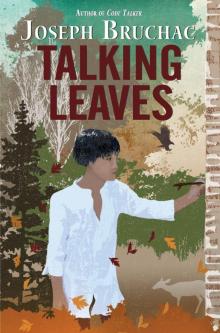 Talking Leaves
Talking Leaves Found
Found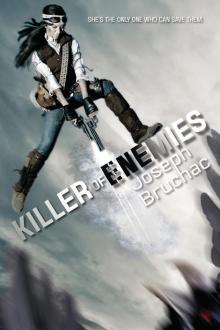 Killer of Enemies
Killer of Enemies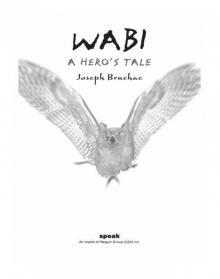 Wabi
Wabi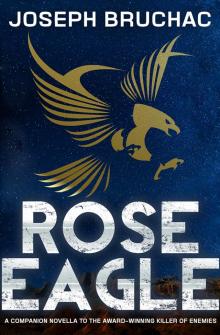 Rose Eagle
Rose Eagle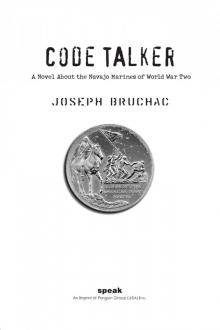 Code Talker
Code Talker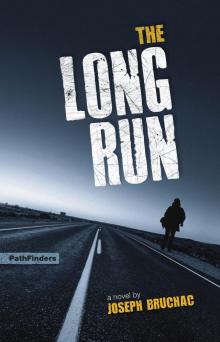 The Long Run
The Long Run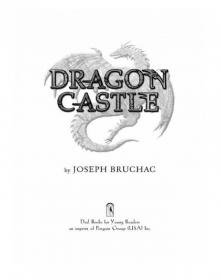 Dragon Castle
Dragon Castle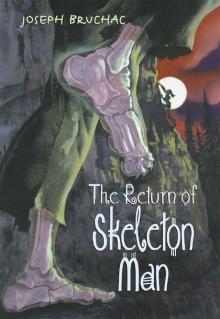 The Return of Skeleton Man
The Return of Skeleton Man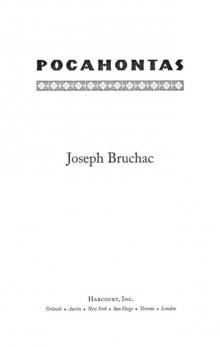 Pocahontas
Pocahontas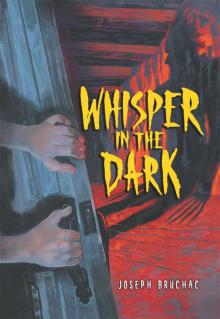 Whisper in the Dark
Whisper in the Dark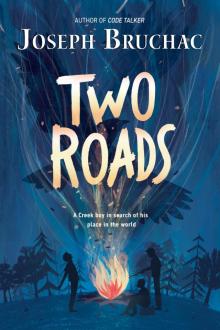 Two Roads
Two Roads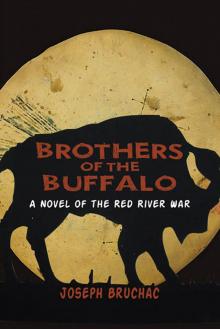 Brothers of the Buffalo
Brothers of the Buffalo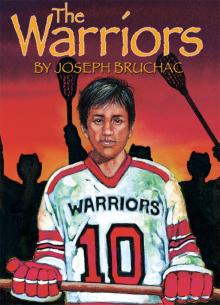 The Warriors
The Warriors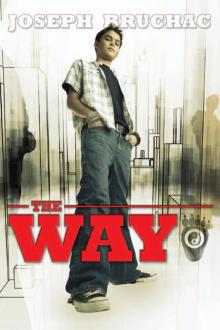 The Way
The Way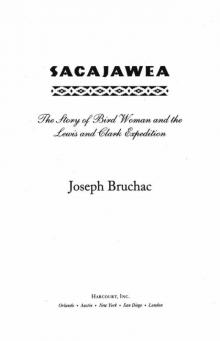 Sacajawea
Sacajawea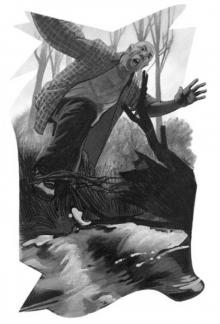 Night Wings
Night Wings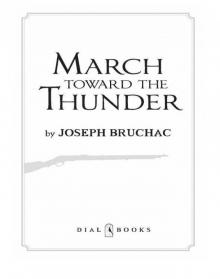 March Toward the Thunder
March Toward the Thunder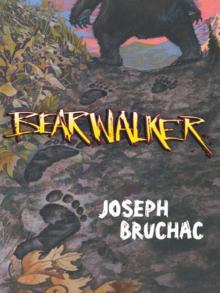 Bearwalker
Bearwalker Skeleton Man
Skeleton Man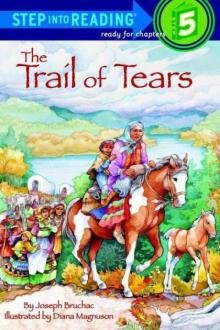 The Trail of Tears
The Trail of Tears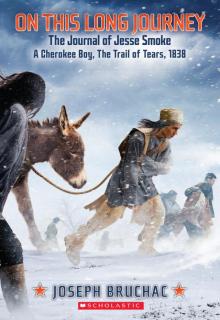 On This Long Journey
On This Long Journey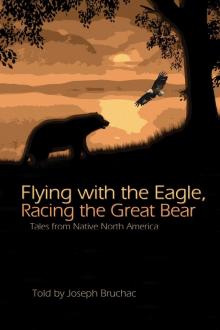 Flying with the Eagle, Racing the Great Bear
Flying with the Eagle, Racing the Great Bear